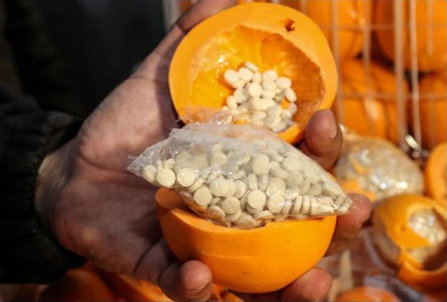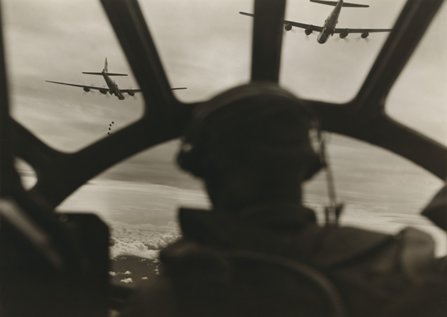The International Curse That Is Captagon

In recent news stories, you may have seen mentions of the drug Captagon being trafficked and used in the Middle East. Where did this drug come from? What is it and what are its effects?
While Captagon may only recently have hit the news services, it is not a new drug on the illicit market. It has the distinction of being an illicit drug that inherited the name and characteristics of a prescription drug.
A Brief History of Captagon
Captagon was at one time the trademarked name of a prescription stimulant manufactured by the German company Degussa Pharma Gruppe. Each Captagon tablet supplied the patient with the stimulant fenethylline, a drug that is similar to amphetamine. In the 1960s, Captagon was prescribed for narcolepsy, as well as eating addiction resulting from brain damage, and hyper-kinetic symptoms during childhood and teenage years (a condition referred to many years later as ADHD).
Once in the body, fenethylline is metabolized into amphetamine and theophylline (a weak stimulant). Therefore, fenethylline has much the same effects as amphetamine. In small to moderate dosages, fenethylline causes increases in heart rate, body temperature, energy, endurance, mood, respiration and blood pressure.

When the drug is misused, a person takes higher doses than what would be prescribed for a patient. They may be seeking effects such as euphoria and a sense of invincibility.
However, several adverse effects show up after long-term use:
- Extreme depression
- Lethargy
- Poor sleep
- Delusions
- Depression
- Paranoia
- Poor appetite resulting in malnutrition
- Heart and blood vessel damage
Fenethylline was originally believed not to have much potential for abuse. This belief turned out to be false. In Europe, it began to be used as a performance-enhancing drug in sports, especially in France and Germany. Its use began to wane by 1986, with only limited production being allowed after that date so the drug could be used to treat narcolepsy. By 2011, the International Narcotics Control Board noted that nearly all stocks of the drug had been depleted.

Around this time, reports began to surface of illicit trafficking and use of fenethylline. For a while, it was not certain whether the remaining medical stores of this drug were being diverted to the illicit market or if clandestine drug labs had begun to manufacture the drug. It became obvious before long that these illicit supplies were newly manufactured.
These new pills were referred to by the same name—captagon—but without capitalization or a trademark. Some of these pills contained fenethylline but most contained only amphetamine and caffeine. Analysis of some pills showed that they contained Viagra or heroin in addition to a stimulant.
Governmental Uses for Stimulants Trigger Widespread Distribution and Addiction
In times of conflict, state organizations often give this type of drug to soldiers and pilots to keep them energetic and alert.
Japan: During World War II, Japanese members of the military and workers doing heavy labor were given this drug to help them meet the needs of the country. Japanese kamikaze pilots in the Pacific were also supplied with this drug to eliminate fear as they carried out their attacks. After the war, the civilian population in Japan experienced severe hardships with a shortage of food and housing. Methamphetamine that was originally produced for the military was made available at pharmacies for the civilian population. Widespread addiction followed and was finally quelled with mandatory hospitalization laws for those found to be addicted.

America: Millions of doses of Benzedrine were distributed to American soldiers during World War II to help them stay alert during prolonged combat or during bombing missions. After the war, the drug was marketed as a treatment for depression. Celebrities such as Jack Kerouac and Marilyn Monroe were reported to use this drug.
Germany: In 1938 and 1939, methamphetamine pills that were brand-named Pervitin were instrumental in enabling German soldiers to move quickly to occupy Czechoslovakia and invade Poland. In 1940, 35 million of these pills were distributed to Wehrmacht soldiers. As a result, these soldiers were able to fight and march for ten days straight, typically marching 22 miles each day. This drug enabled the German army to develop the Blitzkrieg, a fast, intense military campaign because the soldiers simply did not need to stop and rest. Time Magazine noted, “High on Pervitin, German tank and artillery drivers covered ground night and day, almost without stopping. Foreign commanders and civilians alike were caught entirely off guard.”
Britain: Despite criticizing German use of stimulants, British military management began to discreetly authorize the use of Benzedrine for pilots and crew members on flights, starting in 1942. An estimated 72 million pills were purchased for armed forces use in during World War II.
This is the heritage of today’s Captagon tablets coursing across the Middle East.
New Patterns of Use and Abuse
In the new millennium, illicit manufacturing sources for Captagon have been found in Eastern Europe and in many parts of the Middle East. Manufacturing and transit countries mentioned in reports on the situation include Bulgaria, Lebanon, Kuwait, Saudi Arabia, Italy, Greece, Israel, Jordan, Syria, Turkey, Bahrain, Qatar, Yemen and the United Arab Emirates.
The sizes of seizures have been remarkable.
- 2019: Greek authorities seized 4.8 million Captagon tablets from one shipment
- 2020: 84 million Captagon pills were seized in Italy, thought to be a major transshipment point, valued at more than one billion Euros
- 2021: April 2021, Saudi customs officials in the port city of Jeddah seized more than 5 million pills hidden in pomegranates
- 2021: German officials seized 234 kilograms of Captagon tablets coming from Austria, and then 170 kilograms of pills in a related law enforcement action
- 2022: From January to April 2022 alone, the Jordanian Army seized 17 million Captagon pills
- 2022: Saudi authorities seized 46 million Captagon pills concealed in flour
- 2023: Eighty-six million pills (13 tons) were seized in Dubai
New supplies of illicit Captagon routinely mimic the original prescription drug, with a distinctive pattern of two half moons facing each other stamped into each pill. The drug is very inexpensive, costing less than $1 USD in some areas and $10 per pill in others. High-quality Captagon pills may run as much as $25 per pill.
Who Are Captagon’s New Customers?

In Jordan and the Gulf States, Captagon is known as a “poor man’s cocaine.” It is primarily used for two purposes:
- As a recreational drug, to enable the user to party for long hours
- By those with physically demanding jobs to help them stay alert and active for longer periods.
In the Middle East, users often include young people in multiple countries who are facing high stress, unemployment and few sources of entertainment or other activities.
Students preparing for exams and recent graduates unable to find a job also use the drug to keep up their energy and focus or cope with their stress. While this is why users may seek out this drug, interviews with some college students showed that they actually experienced increased levels of stress, felt disorganized to the extent that it impeded their studies and felt isolated from their social circles.
But will Captagon stay in the Gulf countries or migrate to other regions?
Could We See Captagon in the United States?
The U.S. already possesses established channels that manufacture stimulant drugs and traffic them into the country. Methamphetamine is sought by many drug users, either by itself or in combination with opioids. Cocaine’s trafficking channels from South America through the Caribbean or Mexico into the country have existed for several decades. Production and trafficking of cocaine have actually been on an upsurge for the last few years.
These patterns and the familiarity of American drug users with cocaine and methamphetamine make it less likely that Captagon will become a sought-after drug in this country.
But in other countries in the Middle East and Europe, Captagon is a dangerous drug with a high potential to create addiction. Crackdowns on the Captagon industry in the Gulf countries may drive manufacturers to find new markets such as countries in the European Union. European countries have mostly been thought to be transshipment locations, in other words, Captagon manufacturers ship their wares to European nations first, and then to the Middle East. This method reduces the suspicion of customs officials. However, transshipment countries often mutate into final destinations for drug supplies.
Most recently, in December 2023, German law enforcement seized 660 pounds of Captagon pills worth $65 million, indicating that this drug may already be more common in the EU than previously thought. The last thing the EU needs is another drug to plague its citizens.
Eliminating the Problem Internationally
Eliminating any drug problem must take place on several fronts. There must be a public awareness and education campaign offered to students and non-students alike, to inform them of the harm done by drugs and the deceptive ease of becoming addicted. There must be ample access to drug rehabilitation that truly rehabilitates and puts those who are addicted on a sober, productive path. And law enforcement agencies must continue to take these drugs off the market and prosecute unscrupulous manufacturers and traffickers.
It is far too easy to fall into drug use. We must work together to return those who become addicted back to enjoyable and productive lives.
Sources:
- “Captagon: understanding today’s illicit market.” European Monitoring Centre for Drugs and Drug Addiction, 2018. EMCDDA
- “A Bitter Pill To Swallow: Connections Between Captagon, Syria, And The Gulf.” Journal of International Affairs Columbia University, 2016. JIA
- Social and Legal Factors Related to Drug Abuse in the United States and Japan 1994 https://www.ncbi.nlm.nih.gov/pmc/articles/PMC1403573/pdf/pubhealthrep00057-0013.pdf
- “For every war, an abused drug." WHYY, 2015. WHYY
- “World War Speed." PBS, 2019. PBS
- “Neuropsychiatric Implications of Stimulant Abuse.” ScienceDirect, 2015. ScienceDirect
- “How Methamphetamine Became a Key Part of Nazi Military Strategy.” Time Magazine, 2020. Time Magazine
- “The RAF on Speed: High-Flying or Flying High?” JSTOR Daily Magazine, 2022. JSTOR Daily
- “Captagon trafficking and the role of Europe.” HRB National Drugs Library, 2023. HRB National Drugs Library
- “Italian police seize record amount of amphetamines shipped from Syria.” Reuters, 2020. Reuters
- “The Captagon Problem in Saudi Arabia and Other Gulf States. Arab Center in Washington, D.C., 2023. Arab Center in Washington, D.C.
- “Captagon: Jordan’s undeclared war against Syria drug traffickers.” BBC, 2022. BBC
- “UAE police say they have seized $1 billion worth of Captagon amphetamines hidden in doors.” Associated Press, 2023. Associated Press
- “Jordanian University Students’ Lived Experience of Misusing Amphetamine (Captagon).” Journal of Addictions Nursing, 2022. Journal of Addictions Nursing
- “‘Poor man’s cocaine’ costing $3 a pill threatens to proliferate.” Japan Times, 2023. Japan Times
- “Captagon: New bust shows drug becoming common in Europe.” MSN, 2023. MSN


 ®
®